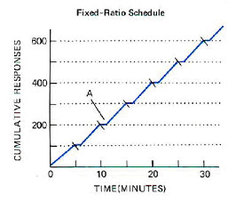 What's he waiting for? What's he waiting for? A few weeks ago, I received my editor's notes for A Death Along the River Fleet. As always, the comments were insightful and thorough, but not particularly hard to address or to think through. And yet I found myself wanting to do anything but sit down and work on them. Everything else was suddenly more immediate, more necessary--organizing a desk drawer, writing a blog post (including this one), and a vast array of other far less important things and activities. Classic procrastination, right?  http://www.betabunny.com/behaviorism/Images/FR.jpg http://www.betabunny.com/behaviorism/Images/FR.jpg But why? Why would I procrastinate on a task that I knew I wouldn't mind doing--that I might even enjoy doing? I mean, usually when I procrastinate, its because there's a task looming that I really don't want to do. Like, cleaning the litter box. Pulling weeds in the garden. Other tedious or annoying tasks like that. So why was I putting off a task that I didn't really mind doing? If it's not procrastination, is it simple weariness? Or maybe fatigue? But I didn't really feel exhausted. I mentioned this question to my husband--my alpha reader and in-house cognitive psychologist--because he can offer a psychological explanation for anything that plagues me as a writer (e.g. Me: "Why can't I remember what happens in my books?" Him: "You're not crazy, you're just experiencing proactive interference.") So in this case, he told me that my most recent issue was probably not truly procrastination, but rather something called a "Schedule of Reinforcement." So the schedule of reinforcement goes something like this: Imagine that an adorable little rat with a bright twitching nose is in a box with a lever. That rat is on a fixed-ratio (FR) schedule, which just means it will receive a food pellet (reward) after every 100 lever presses. Once the rat begins to press the lever, it will work at a fast steady pace until the food reward is earned (the up slope in the figure below). (So if I'm the rat in this scenario, I've earned my reward--I've sent my book in to my editor and received my edits.) However, once the rat earns the reward, it stops responding for a while (the flat point A in the figure). This is known as either the “post-reinforcement pause” or the “pre-ratio pause.” Essentially, the length of the pause is proportional to the amount of work that was required to get to the reward. The interesting part, he explains, is that, generally, the length of the pause is not due to fatigue. Instead, the rat--or other organism, like a human being--seems to use that time to mentally prepare for the large amount of work to come. He says it’s not fatigue because if you artificially get the organism to begin (e.g., place rat paws on lever so that it depresses), then the organism will go on a “ratio run” and perform the behavior until the next reward is given (even if it just completed a run and had no break). So apparently, this has interesting implications for procrastination with humans. As he explains, research on schedules of reinforcement suggest that the best way for a human to overcome procrastination is to artificially get the human to begin the project. For instance, if a college student has to write a term paper, s/he can trick themselves by saying, “I’m only going to write the first two sentences and then I’ll stop.” Often, once they begin, they go on a “ratio run” and write much more than intended (just like when the rat was forced to depress the lever). So, the takeaway for writers (because this is apparently what happened to me): "When you have to dig back into a project (e.g., edits), it’s probably not fatigue that leads to procrastination. That “procrastination time” is used to mentally gear up for the considerable amount of work to come. Even so, simply starting (e.g., on the easy edits), can lead to a ratio run and solid progress." So a scientific explanation for what we all at heart know is the secret for overcoming procrastination: Get your butt in chair and JUST START....but start with the easiest thing possible. The rest will come. And hey, let me know if you have any other writerly conundrums that you would like a professional psychologist to explain. He can come up with a theory for anything. Just address your query to "Dear Alpha Reader." :-)
6 Comments
|
Susanna CalkinsHistorian. Mystery writer. Researcher. Teacher. Occasional blogger. Categories
All
Archives
May 2023
|
 RSS Feed
RSS Feed